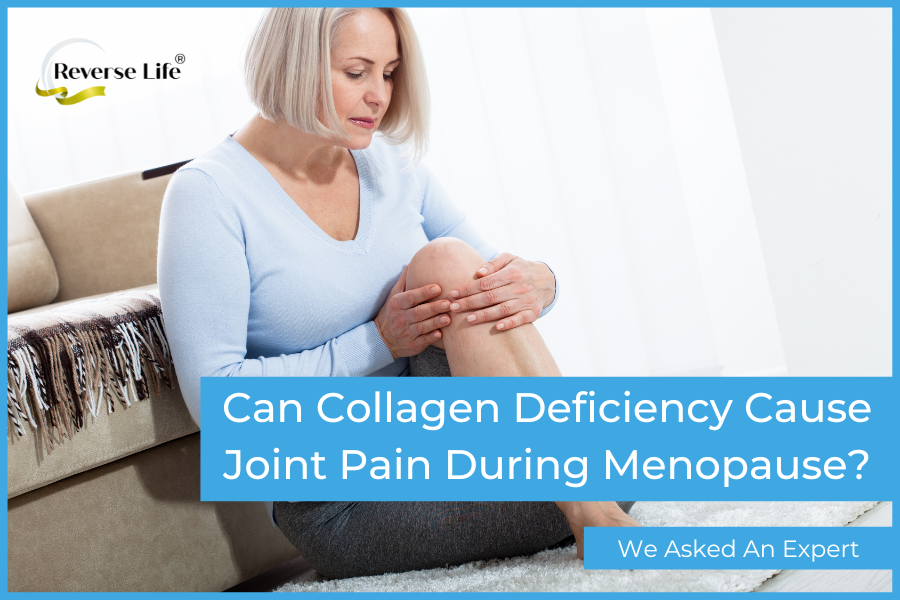Are you suffering from menopausal joint pain? If so, you’re certainly not alone.
While the media has typically associated menopause with symptoms such as night sweats, hot flushes and low mood, joint pain is one of the much lesser talked about conditions. During menopause, joint pain is frequently experienced in the hands, hips, knees, shoulders and hands. It’s not just joint pain, either! An article published earlier this week by MSN (in recognition of October being menopause awareness month), suggests that there are 62, yes 62, symptoms to look out for!

Painful joints are easy to overlook as a side effect of menopause. Instead, joint pain gets bundled into the generic “getting old” bracket.
However, according to the Journal of Women’s Health, joint pain does in fact affect a whopping 40% of all menopausal women, many of whom aren’t anywhere close to what we’d describe as “elderly.”
So what part could fluctuating hormones and lack of collagen have to play?
Did you know that oestrogen decreases collagen production while progesterone increases it?
One of the most common symptoms associated with peri-menopausal and menopausal is fluctuating hormone levels. Those feisty little things just refuse to level themselves out and are constantly in flux throughout the month.

Hormones tend to get a bad rap, and rightly so!
They affect us at every stage of our life, from that early teenage angst to ongoing crazy PMS, and then they hit us again just as we feel like we’ve got our life finally in order! Hormones really are the driving force behind pretty much every psychological, not to mention biological, process in our bodies!
Declining levels of the hormone known as oestrogen can be incredibly destructive.

Oestrogen, along with progesterone and testosterone, are what are commonly referred to as your sex hormones. We’re specifically interested in the part that oestrogen (a group name for 3 types of hormone) plays. One of the key functions of which, along with collagen, is maintaining healthy bones and supple skin.
Oestrogen is a soft tissue relaxant, and if you’re suffering from fluctuating oestrogen levels, ligament laxity (loose, bendy joints) can occur.
However, as oestrogen goes into a more rapid and permanent state of decline, ligaments, along with the skin, become less elastic. That can lead to chronic joint pain not to mention sagging facial features. Recent studies further suggest that depleted oestrogen reduces natural bone density, decreases musical strength and negatively impacts tendon health.
It can be frustrating, not to mention debilitating.
Could collagen supplementation be one of the solutions?

Accredited Menopause Expert Dr Anne Henderson says:
"Oestrogen has a direct impact on the musculoskeletal system, particularly joints. It can decrease collagen which is found in muscles, tendons, ligaments and the joint itself…..A reduction in oestrogen during menopause helps to explain why women of this age are much more likely to suffer from musculoskeletal conditions”
She recommends topping up your collagen levels, especially during your peri and menopausal years when this drop in oestrogen sends a signal to your skin to stop producing collagen.
If you woke up today and noticed more fine lines and wrinkles, that your skin was duller (and less fuller!) than yesterday, and that you had more aches and pains, you guessed it, it’s a sign that you both oestrogen and collagen levels are in decline.
Foods rich in vitamin C and essential amino acids may help maintain joint health and mobility. Think kale and brussel sprouts, red peppers and oranges. Other foods that can help with joint and bone health are:
- Dairy products such as milk, cheese and yoghurt are rich in calcium, potassium, magnesium, and phosphorus, and vitamins K and D.
- Oily fish, including salmon, sardines and mackerel; a wonderful source of omega-3 fatty acids and vitamin D.
- Colourful fruits and leafy greens which are packed with vitamin C

There are also other simple ways you can protect your joints.
How to ease joint pain during menopause?
There are plenty of simple but effective home treatments you can implement, including:
- Gentle stretches
- Hot and cold therapy on affected areas
- Practicing mindfulness and relaxation

Is a collagen supplement good for menopause?
We’ve examined some positive actions you can take to help keep menopausal joint pain in check, but what about collagen supplementation? Can that help? The answer is yes; taking a collagen supplement to support menopausal skin and joints does help. How? By providing the body with an excess of collagen protein that you simply aren’t able to produce by yourself any longer.
Collagen is present throughout the body and oestrogen is necessary to regulate bone density and produce joint lubricating collagen. So, by introducing a high-strength collagen supplement, such as Reverse Life 10,000 mg marine collagen, you can help prevent bone abrasion and minimise painful joints thanks to the cushioning effect of the collagen.
Menopause can be an enjoyable and rewarding phase of life, one that you “live” and fully experience, not just “tolerate.” With the help of a good marine collagen liquid, you can help take control of those menopause symptoms. Maybe not all 62 of them! But definitely plenty of them!
Find out more about Reverse Life high-strength collagen HERE.


